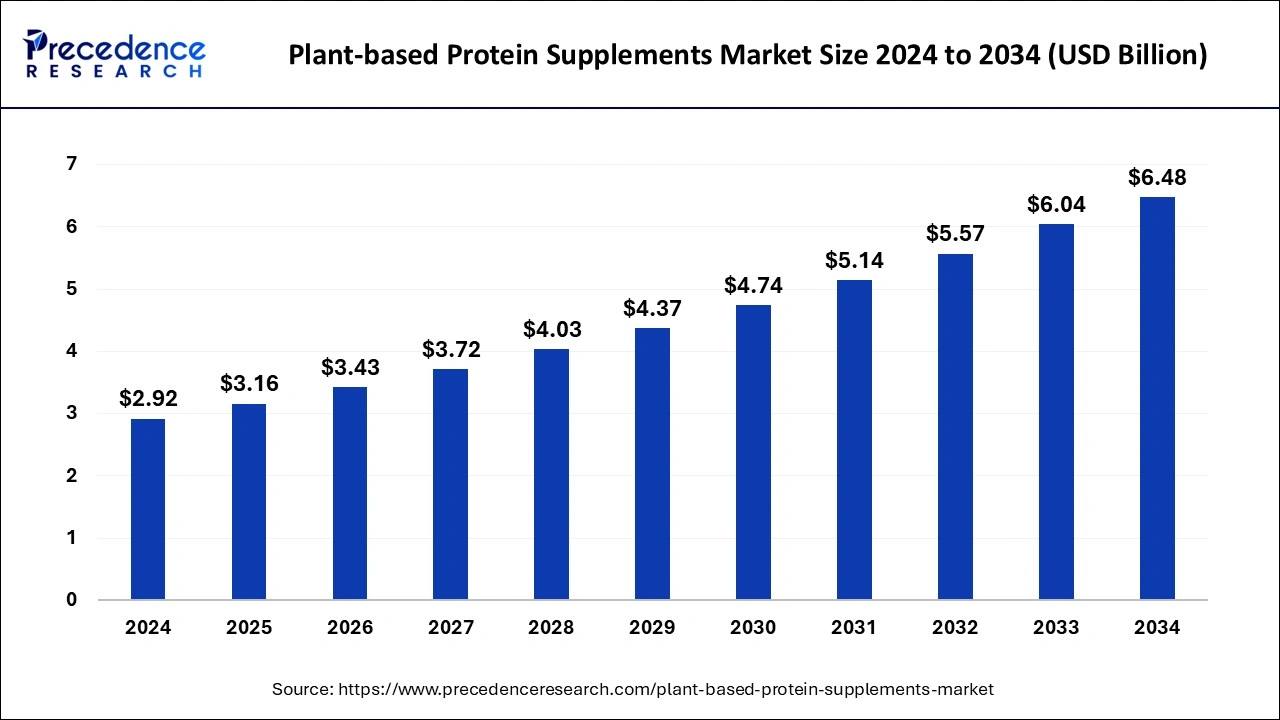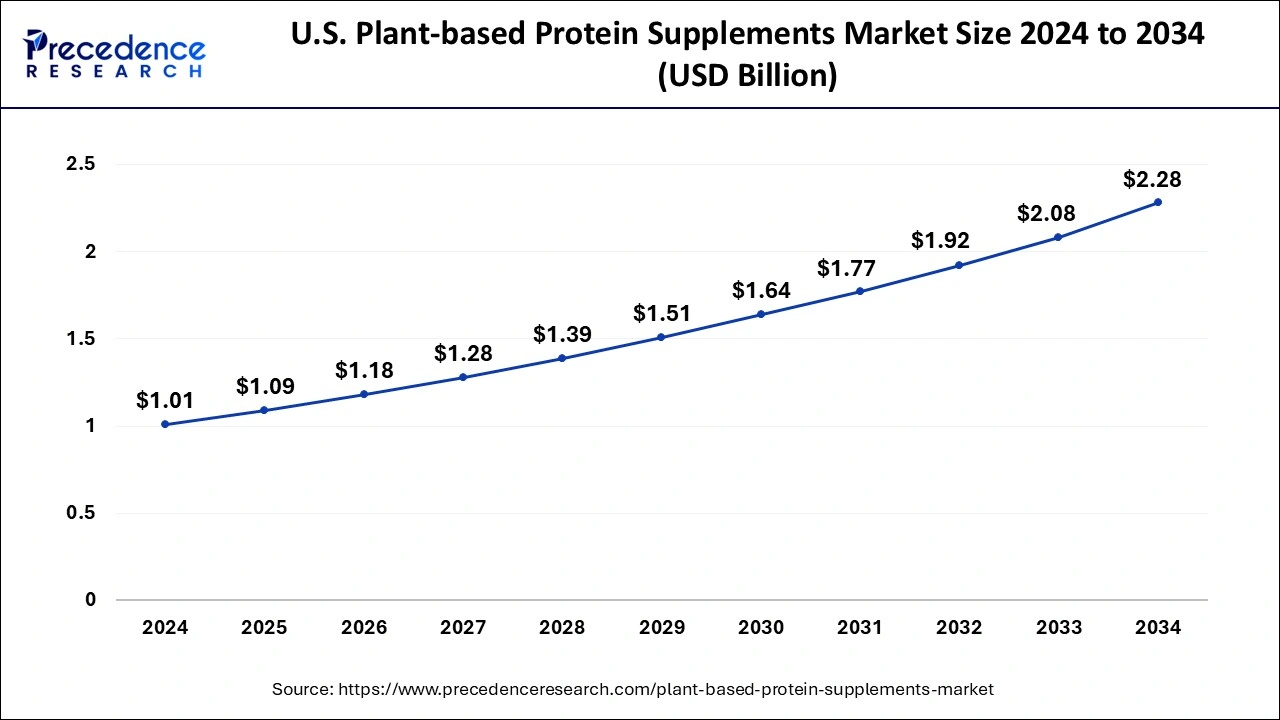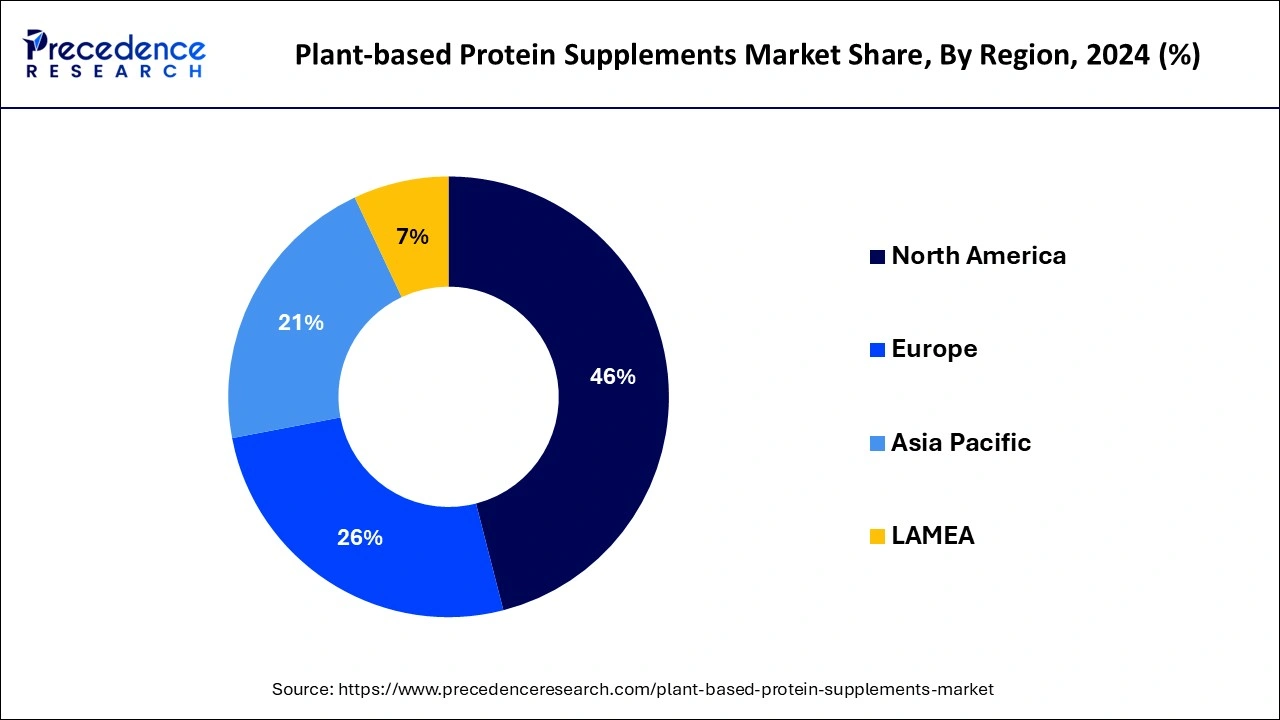January 2025
The global plant-based protein supplements market size is calculated at USD 3.16 billion in 2025 and is forecasted to reach around USD 6.48 billion by 2034, accelerating at a CAGR of 8.30% from 2025 to 2034. The North America plant-based protein supplements market size surpassed USD 1.34 billion in 2024 and is expanding at a CAGR of 8.43% during the forecast period. The market sizing and forecasts are revenue-based (USD Million/Billion), with 2024 as the base year.
The global plant-based protein supplements market size was estimated at USD 2.92 billion in 2024 and is predicted to increase from USD 3.16 billion in 2025 to approximately USD 6.48 billion by 2034, expanding at a CAGR of 8.30% from 2025 to 2034. These supplements help fight disease, live longer, and look and feel younger. They are also great sources of iron, fiber, and essential nutrients that help the plant-based protein supplements market grow.

The U.S. plant-based protein supplements market size was estimated at USD 1.01 billion in 2024 and is predicted to be worth around USD 2.28 billion by 2034 with a CAGR of 8.48% from 2025 to 2034.

North America dominated the plant-based protein supplements market in 2024. Increasing technology in the market of plant-based protein supplements helps the growth of the market in the region. Well-known, established brand manufacturers of plant-based protein products are found in North American countries. The United States is one of the major suppliers of plant-based protein supplements. In Canada, natural health products are considered for muscle-building as supplements, and these are regulated under the Natural Health Products Regulations. Canadian Vegan Protein blend, which is made from plant-based ingredients, makes it vegetarian-friendly and vegan. Drink wholesome North American-made protein powder. These factors help the growth of the market in the region.

Asia Pacific is projected to grow at the highest CAGR in the plant-based protein supplements market during the forecast period of 2025-2034. In China, soy protein is a very popular plant-based protein supplement used after wheat gluten, pea, and rice. From many countries, India imports protein supplements. These factors help the growth of the plant-based protein supplement market in the region.
The plant-based protein supplement market deals with industries in which the manufacturing and distribution of plant-based protein supplements are a type of nutritional supplement made from plant-based components that are used for the growth and repair of human body tissues and cells. Plant-based protein supplements help fight disease, live longer, and feel and look younger. It helps to keep fuller longer. It is loaded with healthy fats, a great source of iron, and easily absorbed by the body.
Plant-based protein supplements are rich in carbohydrates, oligosaccharides, polyunsaturated fatty acids, fiber, essential nutrients, and less fat. They are naturally high in fiber and antioxidants and more nutrient-dense than dairy protein powder. They promote better gut health and digestion. Plant-based protein supplements are environmentally friendly and sustainable options compared to animal-based protein supplements. They are also lactose-free and vegan-friendly. These factors help the growth of the plant-based protein supplements market.
| Report Coverage | Details |
| Market Size in 2025 | USD 3.16 Billion |
| Market Size by 2034 | USD 6.48 Billion |
| Growth Rate from 2025 to 2034 | CAGR of 8.30% |
| Largest Market | North America |
| Base Year | 2024 |
| Forecast Period | 2025 to 2034 |
| Segments Covered | Raw Material, Product, Distribution Channel, Application, and Regions |
| Regions Covered | North America, Europe, Asia-Pacific, Latin America, and Middle East & Africa |
Increased demand for vegetarian and vegan products
A rising number of people are adopting vegetarian and vegan products or diets because it is part of a wide-ranging lifestyle choice. These are more environmentally friendly and sustainable options. It leads to health benefits. These factors help to the growth of the plant-based protein supplements market. Plant-based diets are more acceptable due to their health benefits, and they are less hazardous to the environment than meat-based products or diets.
These types of products help to get the calories with the right numbers and focus on a variety of whole grains, fruits, and vegetables. It limits the intake of alcohol and processed foods. It also helps to avoid unhealthy added salt, sugar, and fats. It helps to engage with plenty of exercise and a healthy lifestyle. These factors help the growth of the market for vegetarian and vegan products.
Side effects of plant-based protein supplements
Plant-based protein supplements have side effects that impact blood sugar levels, potential nutritional deficiencies, intolerance, and allergic reactions. In some cases, digestive issues can occur due to plant-based protein supplements made from protein isolates like peas, soy, rice, wheat pumpkin seed, and Spirulina may be rough on the stomach. You may have some bloat or gas problems. Plant-based protein supplements may be harmful when chemical contaminants like heavy metals, pesticides, or herbicides are used for crops. In some food products, fragments are used, which may be harmful. These factors can restrict the growth of the plant-based protein supplement market.
Rise in the adoption of plant-based protein supplements.
The adoption of plant-based protein supplements can be done by using some ingredients that will be helpful for the growth of the market in the future. These supplements require lower-cost production and easy access in many parts of the world. For a growing population, these plant-based protein supplements are the best option for protein. Increased urbanization, growing senior population, and rising incomes prefer to use protein in their diet. These factors help to the growth of the plant-based protein supplements market.
The soy protein segment dominated the plant-based protein supplements market in 2024. Soy protein raw material type is an adaptable ingredient that is used in a high range of food products like meat substitutes, protein bars, and shakes. These are also generally found in infant formulas, which provide high-quality protein sources for growing babies. Soy proteins are plant-based protein products that are a great alternative to meat-based protein products or animal-derived sources of proteins. These factors help the growth of the soy protein raw material type segment and contribute to the growth of the market.
By raw material, the pea protein segment is expected to grow at the fastest rate in the plant-based protein supplements market during the forecast period. Pea proteins are plant-based protein supplements that contain digestible iron and amino acids. That helps to improve blood sugar, build muscle mass, control appetite, and other benefits related to metabolism. These pea proteins are good for men’s health and skin and improve heart and eye health. It also helps build immunity, digestion, and weight loss, and it is a good source of iron. These factors help the growth of the pea protein raw material type segment and contribute to the growth of the market.
The protein powder segment dominated the plant-based protein supplements market in 2024. Plant-based protein powders are a great source of healthy fats and iron and are easily absorbed by the body. It helps to keep the body strong, youthful, and healthy by keeping a strong immune system and helping to fight disease. Protein powder is free of harmful bacteria, antibiotics, and less saturated fat and is easy to digest. These protein powders help to support inflammatory response, healthy lipid levels, and blood sugar levels. These plant-based protein powders are rich in essential nutrients, fibers, and less fat. These help boost metabolism, keep fuller for longer, and regulate gut health. These factors help to the growth of the protein powder product type segment and contribute to the growth of the market.
The protein bars segment is expected to grow significantly during the forecast period. Protein bars are helpful in muscle gain and weight loss as a meal replacement. Protein bar's main benefit is the dosage and quality of the protein content. These factors help the growth of the protein bars product type segment and contribute to the growth of the market.
The ready-to-drink (RTD) segment is projected to grow at the fastest CAGR in the plant-based protein supplements market during the forecast period. Ready-to-drink product-type plant-based protein supplements are helpful in muscular deterioration prevention, loss of weight, increase of muscle, ability to keep a healthy weight, lowered blood pressure, stronger bones, and management of hunger levels. These ready-to-drink plant-based protein shakes are helpful to reduce the risks of illnesses like diabetes, cancer, heart disease, and strokes. These benefits of ready-to-drink product-type plant-based protein supplements help the growth of the segment and contribute to the growth of the market.
The online stores segment dominated the plant-based protein supplements market in 2024. Advantages of the online store include digital alerts for the deals, easy access to helpful reviews and promotions, independence, full profit margin, instant payment facility by our bank account, cross-selling, up-selling, retargeting, SEO possibilities, direct interaction with the buyers, control over brand image, no crowds, easier brand comparison, product evaluations, more varieties, convenience, and better costs. These factors help the growth of the online store distribution channel type segment and contribute to the growth of the market.
The supermarkets/hypermarkets segment is expected to grow rapidly in the plant-based protein supplements market. Offline retail stores include supermarkets or hypermarkets, which have advantages such as instant purchase, sales assistance, touch, and examination. Supermarkets or hypermarkets are viable options for many businesses. To establish a personal touch or connection, these supermarkets or hypermarkets offer customers an opportunity. These factors help the growth of supermarkets or hypermarkets in the distribution channel type segment and contribute to the growth of the market.
The functional foods segment dominated the plant-based protein supplements market in 2024. Functional foods, also called nutraceuticals, are more nutritious and linked with many powerful health advantages. They can protect against diseases, improve proper development and growth, and reduce nutrient deficiencies. Functional foods may include oat products, garlic, etc. These functional food ingredients include organosulfur compounds, soluble fiber, and omega-3 fatty acids that may help to reduce heart disease, total or LDL cholesterol, and triglycerides. These factors help the growth of the functional food application type segment and contribute to the growth of the market.
The sports nutrition segment is expected to grow rapidly in the plant-based protein supplements market during the forecast period. Nutrition plays the main role in sports performance. For the athlete population, nutrition requirements are more important than those of the non-athlete population. By decreasing fatigue, athlete performance can be improved by using sports nutrition. To provide energy for activity and growth, the proper amount of fluids, macronutrients, and micronutrients must be provided. To improve performance, athletes need sports nutrition. These factors help the growth of sports nutrition application type and contribute to the growth of the market.
By Raw Material
By Product
By Distribution Channel
By Application
By Geography
For inquiries regarding discounts, bulk purchases, or customization requests, please contact us at sales@precedenceresearch.com
No cookie-cutter, only authentic analysis – take the 1st step to become a Precedence Research client
January 2025
November 2024
January 2025
April 2025